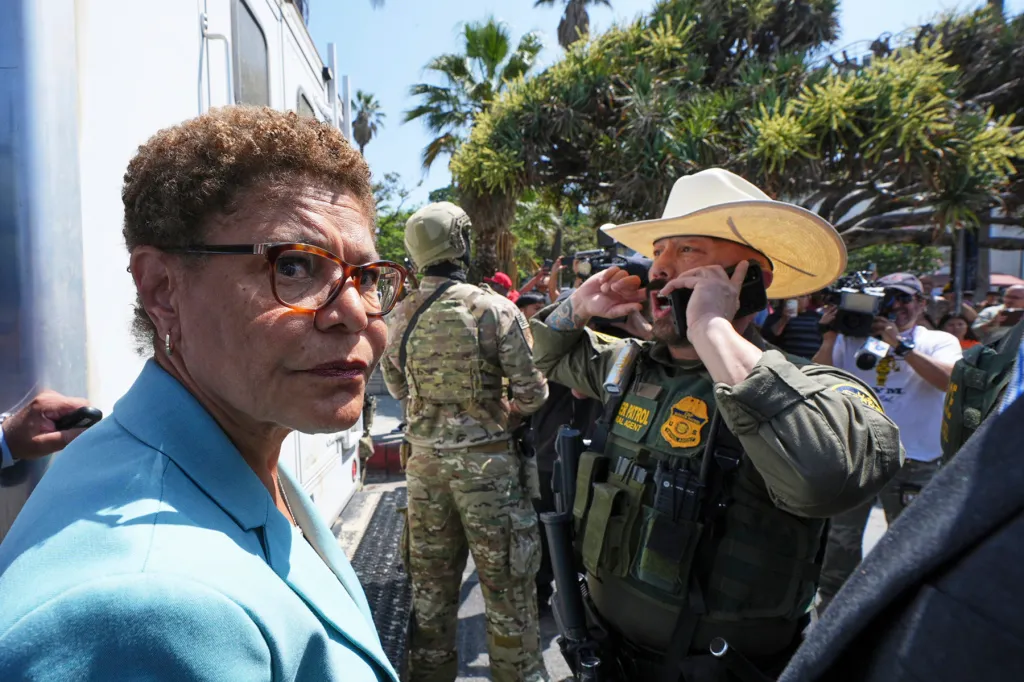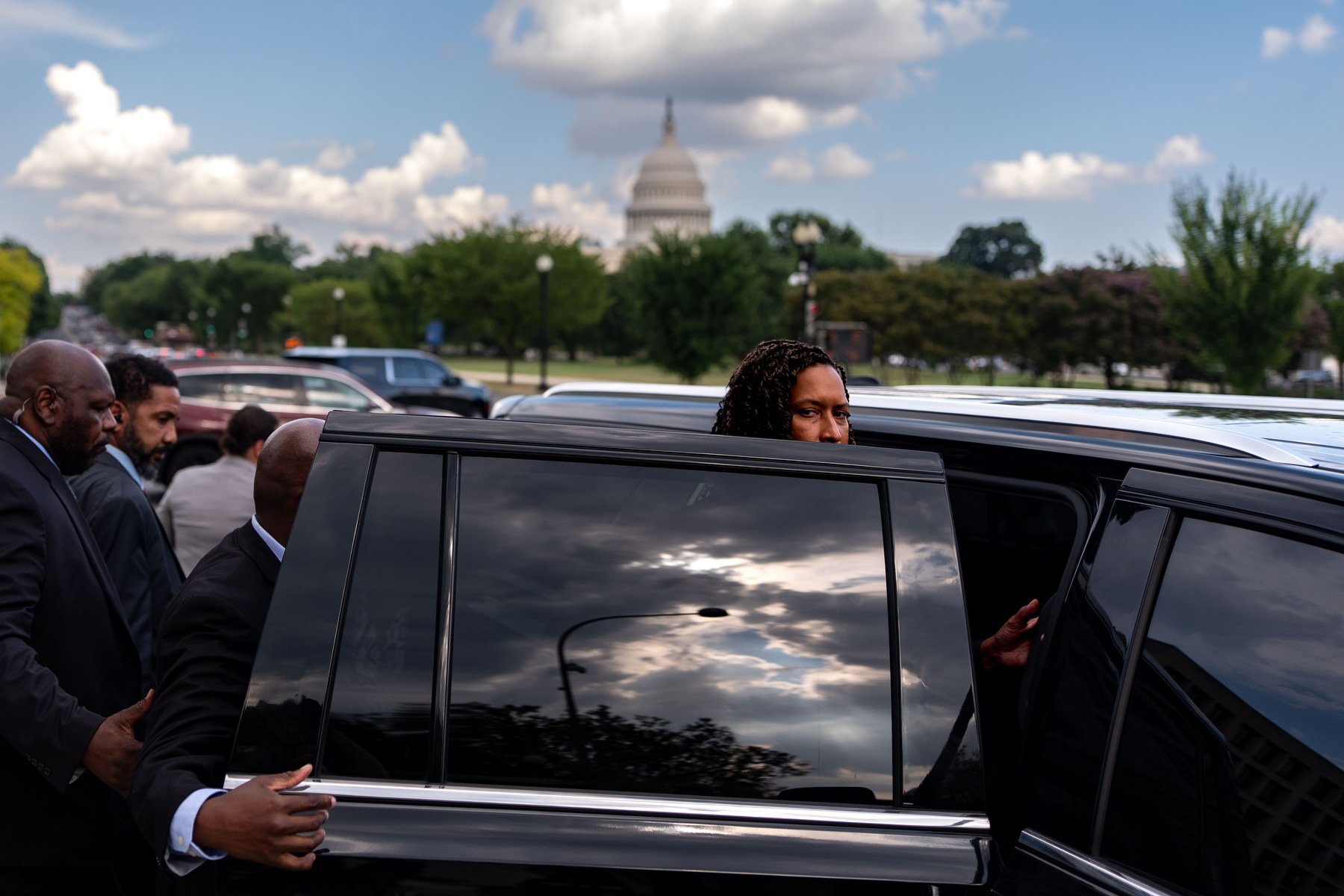Republican President Donald Trump’s continued power grab in the nation’s capital, and his threat to expand his militarized takeover to other Democratic-led cities, is setting up a high-stakes showdown over the country’s democracy that pits him prominently against a familiar political foe: Black women.
On August 11, Trump declared that crime in the District of Columbia was “out of control,” despite violent crime being at a 30-year low, and directed Mayor Muriel Bowser, a Black woman, to hand over control of the city’s police force. Trump then attempted to oust the city’s police commissioner, a Black woman, and replace her with a White man, before backing down after the city threatened legal action. Now, his Justice Department is investigating the accuracy of the reported crime statistics, which the agency touted in a still-available press release earlier this year.
“Mayor Bowser better get her act straight or she won’t be mayor very long because we’ll take it over with the federal government and run it like it’s supposed to be run,” Trump said from the Oval Office on Friday, calling the city a “crime-infested rat hole.”
Earlier this summer, Trump deployed Immigration and Customs Enforcement officers and thousands of National Guard troops to Los Angeles in response to protests over his administration’s immigration raids — the first time in 60 years that a president had taken such action without a governor’s request. Los Angeles is led by Mayor Karen Bass, another Black woman, who confronted the uninvited federal agents in a high-profile exchange at a city park.
Using the District of Columbia as a template, even though 79 percent of its residents oppose Trump’s actions, according to a Washington Post/Schar School poll, the president has, citing crime, threatened to send federal law enforcement back into Los Angeles, and to Baltimore, Chicago, Oakland and New York — all cities led by Democratic Black mayors, including Barbara Lee in Oakland.
And the power struggle between the administration, its allies and Black women is not limited to mayors. Texas state Rep. Nicole Collier said she was held as a “political prisoner” in the state Capitol overnight this week due to Democrats’ opposition to a Trump-ordered redistricting plan aimed at shoring up U.S. House control in the midterms. Trump, who has lobbed escalating complaints at the Federal Reserve for not lowering interest rates, on Wednesday called for the resignation not of its chair, Jerome Powell, a White man, but its governor, Linda Cook, after his housing finance agency chair launched an investigation into her personal mortgages.

While Trump’s retribution is neither currently nor historically limited to Black women, or to women or people of color more broadly, and is directed at anyone who opposes him, including one-time supporters, there are twin realities colliding when it comes to Black women political leaders, said Sydney Carr-Glenn, a political scientist at the College of the Holy Cross. Black women have in recent years reached new levels of political power and are the electoral group that most opposes the president. It’s converging at an “interesting time,” Carr-Glenn said, given the “simultaneous penalty that Black women face in this country on account of being both Black and women.”
“We have seen Black women really ascending to these roles of political prominence in recent years in ways we haven’t seen before,” said Carr-Glenn, who studies race, ethnicity and politics. She cited big-city mayors like Bowser, Bass and Lee, along with high-profile Trump critic U.S. Rep. Jasmine Crockett; Supreme Court Justice Ketanji Brown Jackson, the first Black woman in the role; and former Vice President Kamala Harris, whose South Asian, Black and gender identities drew related attacks from Trump as the two competed to lead the country in the 2024 elections.
“Black women have certainly been breaking these barriers but it’s also come at a really interesting time in our American government, and our democracy, when we are seeing this rise in authoritarianism,” Carr-Glenn added. “And it presents different challenges for Black women who are trying to really push back against what we’ve seen.”
For Harris, her identities as a Black, South Asian woman meant enduring and sometimes having to respond to attacks based on her race and gender during the 2024 campaign. Trump amplified suggestions that Harris traded sex to get ahead in her career and questioned whether she was actually Black, suggesting she was deploying her racial identity for political benefit. In the closing weeks of the race, high-profile Trump supporter and former Fox News host Tucker Carlson likened Trump to a dad who was going to spank Harris because she was a “bad little girl.” Then-Trump ally Elon Musk’s super PAC cut an ad that called Harris a “big ol’ c-word,” before eventually saying the “c” stood for communist.
-
Read Next:
Though Harris’ presidential bid was historic, becoming the first Black woman to be nominated by a major party, she ultimately failed to be elected as the country’s top executive. No Black woman has been elected governor of a state yet either, noted Jamil Scott, an assistant professor at Georgetown University who has written about the political power of Black women mayors.
“So where is the next place to let the backlash flow? It’s in cities with very visible executives that are Black women,” she said. “This is in many ways a political warning, a political message, to say to these Black women and other Black mayors and other women of color mayors, ‘Your leadership can be challenged, too.’”
Victoria Woodards, the mayor of Tacoma, Washington, and a board of trustees member for the African American Mayors Association, said Black women mayors are resilient despite the realities they face in a job that requires balancing community needs with external pressures from state and federal governments.
“These are women who, despite all of the things that have been in their way or barriers that have come to them, they are still fighting the fight. They are still getting up every day and going to city hall,” she said. “They are still doing the jobs, because that’s what’s required of us.”
Wendy Via is co-founder and CEO of Global Project Against Hate and Extremism, an organization that tracks how online discourse shapes the potential for political violence. Via said the president’s actions against the mayors and their jurisdictions are “part of the authoritarian playbook” to try to crush political opposition. She noted that demonizing them creates an “enemy” that can later be used to justify military action and formal policy that removes rights.

Support The 19th’s ambitious plans
As part of our three-year strategic plan, we’ll keep showing up in the way you’ve told us you need us to: as your relatable guide to an unequal nation. Your support will help drive our plan forward.
“I do not think it is an accident that the mayors he’s gone after have been Black women, because another trait of authoritarianism is demonizing communities that have a history of being marginalized,” Via said. “When you can send in the troops and it’s a Black woman leader on the receiving end, then it’s not such a big deal to send in the troops — because they’re already the enemy, and they must not be capable of managing their city.”
The manner in which Trump insults Black women political leaders frequently calls into question their ability and aptitude to do their jobs.
The president just this week repeated a demand that Crockett, the Dallas-area representative who uses her post on the House Oversight Committee to hold the administration accountable, take an intelligence test. He also put quotation marks around the word congresswoman in a move to delegitimize Crockett’s stature and demeaned the progressive group of mostly women House members of color known as the Squad.
Crockett responded in a fundraising email that “Donald Trump just cannot stop thinking about me. He’s insulted me, challenged me to an IQ test — but now, he’s finally said something I agree with.” She then linked to a social media post in which the president wrote: “Jasmine Crockett is the future of the Democrat party!”
Black women have also faced physical restraint and even arrest for opposing the president’s actions.
-
Read Next:
Rep. LaMonica McIver of New Jersey is the first sitting member of Congress to be prosecuted by the Trump administration. She was indicted on three counts of “forcibly impeding” law enforcement during a confrontation earlier this summer outside an ICE facility. She pleaded not guilty, and in a recent court filing argued that her prosecution showed “unconstitutional differential treatment” because the Trump administration dropped cases against defendants facing the same charges over their actions during the January 6, 2021, insurrection at the U.S. Capitol. When McIver denounced as racist Trump’s characterization of his militarized incursion into the District of Columbia as “liberation day,” a White House spokesman called her an “unserious person.”
In Texas, Collier spent the night in the Capitol alone after she refused a GOP-mandated law enforcement escort to monitor her whereabouts ahead of a vote on the Trump-requested congressional redistricting map, which had previously prompted Democrats to delay the vote by leaving the state, and Republican Gov. Greg Abbott to order their arrests.
“I thought: ‘Hell no,’” Collier said in a video released to the public.
Collier settled in for her long night on the House floor with a blue eye mask and white-and-red blankets and a small Texas flag that marked a page in the book “African Founders: How Enslaved People Expanded American Ideals.” She abruptly left a video call with U.S. Sen. Cory Booker and California Gov. Gavin Newsom on Wednesday after someone off screen informed her she faced a felony charge for speaking from the Capitol.
Scott said the president may be miscalculating how leaders like Bass and Bowser will respond to his attempts to seize their power — partly because of their own years of experience in politics, and partly because of how the information ecosystem is shaped now. Mayors are able to directly communicate with constituents in ways that may have been more limited in the past. Plus, social media platforms allow the public to see the impact of troops on the streets in these heavily Democratic communities where they are not welcomed.
“There’s a narrative that’s being placed on them, but they’re able to negate those narratives by what they themselves put out there on social media,” she said. “These are folks who are not shying away from the media … they want to talk about what they’re doing.”






